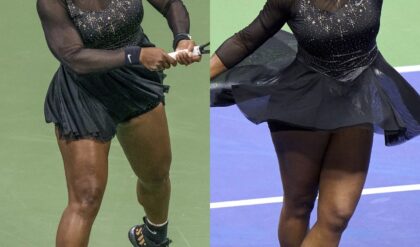The former world heavyweight champion reflects on his east London early years, sparring Tyson as a teenager, and meeting his heroes Nelson Mandela and Muhammad Ali.
“It was funny,” Lennox Lewis says, “because I used to go out with my son, Landon, and people would hold up their fist and shout my name. He was so confused and horrified. He would say: ‘Why are these people holding up their fists as if to fight you?’”

Landon Lewis is now 16 and he and his sisters understand the reason why strangers still wave their fists and shout to their dad with reverence. The son of the former undisputed heavyweight champion of the world is interested in boxing and Lewis expresses pride when describing the reaction of his children to a new documentary about him. “They love it. They see me with Nelson Mandela and Muhammad Ali and it’s narrated by Dr Dre, which means a lot.”
Dr Dre, the great rap artist, was at his imperious peak during the 1990s when Lewis was also at his best. Lewis’s last two fights, and victories, were against Mike Tyson in June 2002 and, a year later, Vitali Klitschko – which show how he linked different eras of heavyweight boxing. Having made his name by stopping his bitter American rival Riddick Bowe in the super‑heavyweight final of the 1988 Olympic Games to win gold for Canada, Lewis returned to Britain, his country of birth, to launch a professional career.

Lewis has always been an intelligent and singular man and so it was fitting that, even while Don King, Bob Arum and every other major promoter in the world chased him, he signed with a diminutive but vocal Londoner in Frank Maloney – the antithesis to the big shots of American boxing. We would eventually recognise the extent of that contrast when Frank, a middle-aged father of three, opted for gender reassignment and became Kellie Maloney in 2015.
Maloney features in the documentary as do Lewis’s mother and wife, both called Violet, alongside his close-knit team. Inevitably, attention is drawn to Lewis’s interaction with Tyson. The closing scenes, when Tyson pays eloquent and tender homage to the man who vanquished him, are moving. They are the opposite of the archive footage that resounds like a riveting echo through the film as an unhinged Tyson sneers: “Lennox Lewis, I’m coming for you … I’m the most brutal and vicious and ruthless champion there has ever been. Lennox is a conqueror? No. I am Alexander. He’s no Alexander. I’m the best ever … My style is impetuous, my defence is impregnable and I’m just ferocious. I want your heart. I want to eat his children.”

Lewis laughs. “When he said he’s coming for me, I’m like: ‘He’s coming for me? He’s crazy. Doesn’t he realise I’m coming for him?’ When he said he’s going to eat my kids my mum said: ‘What’s he talking about? You don’t have no kids.’ I’m not into that vulgar jailhouse talk.”
Did Lewis ever feel apprehensive of Tyson? “Yes and no. Yes, because TV made him look like King Kong. But, no, because Manny [Lewis’s legendary trainer Emanuel Steward] always told me Tyson would be my easiest fight. I’d say: ‘Come on, now. He’s going to be a little difficult.’ But Manny said: ‘No. It’s your easiest fight.’”
Lewis was much bigger than Tyson. He also could rely on his technical excellence and steady temperament to bludgeon Tyson to an eighth-round stoppage that shattered the myth of Iron Mike once and for all. Was it as easy as Manny promised? Lewis laughs. “No.”
There was a misconception that Lewis, because he played chess rather than spewed out trash-talk, was not as hard as his American counterparts Tyson, Bowe and Evander Holyfield. His complicated British and Canadian past was also misleading because it implied he had not withstood the adversity endured by US heavyweights. But Lewis lost his mother for five years at a crucial stage of his young life and he knew his father only fleetingly.

There is evocative material in the documentary about Lewis’s early years in east London, when his mother had to leave him to earn a living in Canada. He slipped towards a troubled existence until his mum finally managed to bring him to Canada – where he soon discovered boxing. He was nurtured by his first trainer, Arnie Boehm, about whom Lewis still speaks warmly.
“Arnie is the first guy that’s seen my talent and he also saw a young kid he could help outside the ring. He cared about kids. He was one of these guys that would have 15 kids in his car and we’d travel three hours to a tournament.”
Boehm also took Lewis to the Catskills so he could spar Tyson who, being a year younger, was 15. Did Boehm know Cus D’Amato, Tyson’s famous trainer? “No. They met the first time then and got along great. They had the same type of love for boxing and care for us as kids. It was an important visit because I wanted to learn my craft and be a pugilist specialist.”

Did he have an affinity with Tyson when they were teenagers? “I liked him. We got to know each other pretty well. We spoke, we went down to the town, went to a dance together. He was a giant because during training in the Catskills you’d watch him knocking people out easy. I thought he was great. When the time came I knew we would meet in the ring. I wanted to know if what Cus said would come true.”
D’Amato had predicted Tyson and Lewis would become world champions and that they would fight each other. “I felt it too,” says Lewis.
”It was always important to me to prove that I’m the best. But from the start of my career, there was always Mike Tyson. Whatever else happened people always said, ‘Lennox beat this guy, and Lennox beat that guy, but what about Tyson?’ I had to fight Tyson. Otherwise, the history books would have read, ‘Yeah, Lennox was good, but he never beat Tyson.”

It seems apt that last Saturday night, while Tyson stepped into the ring again for a pointless exhibition against Roy Jones Jr, Lewis was on the smart side of the ropes, offering analysis for television. When we spoke first last week, Lewis was mildly amused by the prospect of two great old champions pulling on the gloves in their 50s. When I commended him for resisting all siren calls to return to the ring, Lewis joked: “I’m taking on the winner.”
“You’ll learn that you can do it your way,” said Lewis in earnest. “Mentally you have to stay focused and be strong; it doesn’t matter what gets in your way. Look at a negative as a learning experience and work hard to make sure that it doesn’t happen again. Anything you want to achieve in life you can, and you can do it honestly and respectfully. It doesn’t matter if you’re poor or if you come from a broken family, it’s all down to you and anything is possible.”





